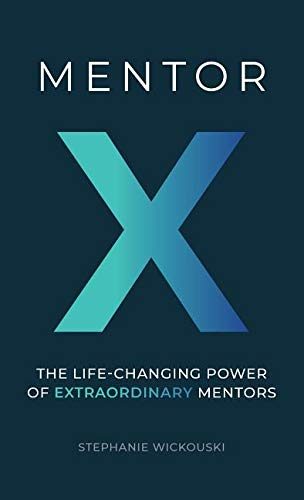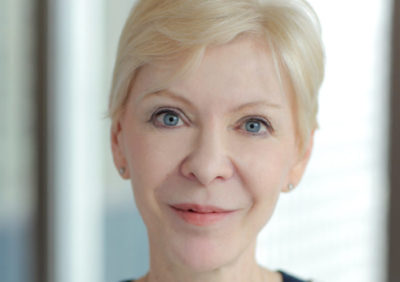 Stephanie Wickouski, an author of two books about bankruptcy, set her sights on a very different topic for number three: mentoring. It was not planned. But after writing a series of blog posts about her search for a new mentor last year, she found the topic resonated with so many people and elicited such strong reactions, she knew she was onto something. Wickouski, a partner at Bryan Cave Leighton Paisner, recently spoke about her new book on mentoring, ‘‘Mentor X: The Life-Changing Power of Extraordinary Mentors.’’
Stephanie Wickouski, an author of two books about bankruptcy, set her sights on a very different topic for number three: mentoring. It was not planned. But after writing a series of blog posts about her search for a new mentor last year, she found the topic resonated with so many people and elicited such strong reactions, she knew she was onto something. Wickouski, a partner at Bryan Cave Leighton Paisner, recently spoke about her new book on mentoring, ‘‘Mentor X: The Life-Changing Power of Extraordinary Mentors.’’
Why did you choose to focus on the perspective of a protégé rather than a mentor?
I talked to a lot of young lawyers, particularly women lawyers, in my firm who told me about their own experiences of having mentors, good and bad, their own thought process, and what was really going on with them. It struck me that no one is really listening to us. I say ‘‘us’’ because what I have gone through with my own search for advice very much matches up with what younger lawyers are experiencing.
I very much related to what I was hearing. But it struck me that nobody was really writing about the person who is the protégé in the mentor experience—their needs, their questions, and their experiences.
How did you come to recognize the value of mentors in your own career?
Well, there are very few people in my life that I regard as mentors, I would say maybe three. And as a woman lawyer, you are bombarded by advice. Much of it is bad and over time you come to realize that there are certain people who consistently give you good advice and those are the people that I regard as mentors.
Do you think it is especially important for female lawyers in Big Law to cultivate a mentor?
Well, I think it’s important, but I think that men need mentors too. Actually, men need mentors just as much, but I do think that women verbalize their need for a mentor and their mentorship experience more than men. That may be because, in our society, women grow up being told that they have a need for a mentor and that a woman’s success depends on having a mentor.
Perhaps because the expectation is that men have built-in mentors, although that is often not the case. But I have to say that even though the book is gender-neutral and is not directed exclusively to men or to women, it was inescapable that the book was informed by my perspective as a woman lawyer, particularly a woman lawyer in Big Law.
Do you think law firm mentoring programs aimed at women are effective?
They are good programs, but they are not necessarily about mentoring because I think that mentoring in my construct is a unique relationship between two people where the mentor is a trusted adviser to a particular person. Their minds click so to speak and the mentor can see the protégé objectively, not as a reflection of the mentor himself, and without any implicit bias.
I think that kind of relationship might arrive in the course of meeting up in a mentorship program, but one of the difficulties with mentorship programs is that they tend to be brokered or arranged through third parties. No matter how well-intentioned, those people are not necessarily in a position to be that kind of match because it does rely on the individual. What might appear logical is not necessarily the actual mentor relationship.
I think that the mentor programs produce a lot of good, have a lot of good results in the sense of improving communication and collaboration and breaking the generational divide in law firms. But it’s not necessarily about true mentorship in the traditional sense or in the strict sense.
How do you know whether a mentor has your best interests at heart?
Well, in my book I actually have a chart for this. Some of the questions to ask are: Does your mentor see and understand who you really are? Does your mentor tell you the truth? Does your mentor give you advice and is the advice good? Does your mentor reduce your fear and doubt?
After talking with your mentor, do you feel hopeful and happy? That is very important. If a mentor is always making you feel bad, chances are he is not a mentor. Also: Do you have a sense that your mentor sees you independently of any of your personal or demographic characteristics? You do not necessarily, as a woman, need to have a woman mentor even though that can be a benefit, but if it’s not another woman, it needs to be a person who sees you independently of the fact that you are a woman.
Do you think it’s important to formally acknowledge your mentor as such?
Well, I think it depends on the person. In my own experience, I feel it’s best not to label it because I think sometimes labeling any relationship inhibits its development. If it’s labeled too quickly or labeled before it develops, then it never has the chance to develop.
Also, you can outgrow relationships and I think that having a label inhibits people from moving on when it’s time to move on.
What’s been the reaction to the book from your clients?
The reaction that I have gotten from clients has been very positive. Many clients are very interested in this subject for their own organizations because their most important asset is human capital. And so talent development, talent management, and retention of talent are at the top of their lists. I think that this also resonated with a lot of clients because I am a woman and because of their interest and prioritization of diversity and inclusion.



